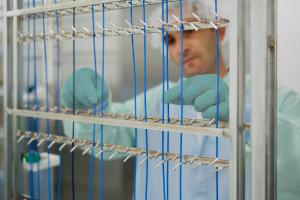Key Stakeholders Including Reps of EU Commission Recognise Urgent Need for Healthcare to Join Circular Economy
“Towards a More Circular, Sustainable and Economic Healthcare System in Europe” Webinar Highlights Environmental Benefits of Medical Device Remanufacturing
Remanufacturing, a key component of this plan, will be available to EU member countries under the Provisions of Article 17 of the new Medical Device Regulation from May 26, 2021 only if EU member countries’ Ministries of Health “opt in” to the relevant provisions of the Regulation.
The “Towards a More Circular Sustainable and Economic Healthcare System in Europe” webinar was attended by nearly 100 hospital administrators, EU regulatory officials, and thought leaders from environmental organizations and industry. The event was held 11 March and is available for free.
“EU Ministries of Health have the ability to dramatically cut greenhouse gas emissions from hospitals by opting-in to the medical remanufacturing provisions of the new MDR,” said Dan Vukelich, President and CEO, Association of Medical Device Reprocessors. “The high level of interest in this event is evidence of the urgency of extending the circular economy to the health sector by remanufacturing rather than wasting hospital assets and causing unnecessary environmental damage.”
Presenters included:
Dorota Napierska, representative of the environmental advocacy group, Health Care Without Harm Europe remarked that over 70% of hospital greenhouse gas emissions come from the supply chain and that remanufacturing medical devices is part of the solution to substantially reduce the health sector’s impact on climate change.
Paola Migliorini, Deputy Head of Unit, DG ENV, the European Commission, discussed the EU Circular Economy Action Plan and the Sustainable Products Initiative, which aims to make products placed on the EU market more sustainable. She confirmed the importance of integrating the healthcare sector into these programs, given its economic significance and environmental footprint.
Sirpa Pietikäinen, Member of the EU Parliament, EPP Group, implored the health sector to act swiftly to find ways to produce the same quality outputs, but with only one tenth of the resources. All products and packaging marketed in the EU should be durable, upgradeable, reusable, repairable, and recyclable at the highest level.
In the keynote presentation, Anna Schulte, the lead researcher of a detailed life cycle analysis study published recently in the Journal Sustainability, provided scientific evidence of the substantial environmental benefits of medical remanufacturing. The study by the Fraunhofer Institute for Environmental Safety, and Energy Technology UMSICHT, shows that remanufactured “single-use” devices cut greenhouse gas emissions in half compared to using virgin or new devices. The study determines that medical remanufacturing reduces the CO2 footprint by 50% and resource usage by almost 30%. She stressed that remanufacturing should be prioritized over recycling, as this preserves the product, resulting in higher circular value creation.
Erik Hansson the Deputy Head of Unit of Medical Devices and Health Technology Assessment, DG SANTE (Health and Food Safety) of the European Commission, which is responsible for implementing the new MDR, summarized the steps Member States need to follow if they wish to “opt in” to the provisions of Article 17, which enable the reprocessing of “single-use” medical devices. There are two options. The first imposes the full requirements of the MDR on medical device manufacturers (CE). The second limits the reprocessing and the further reuse of the reprocessed single-use device within a health institution and requires adherence to a regulation adopted by the EU Commission in August 2020, the Common Specifications (CS). These provisions ensure that safety and performance of reprocessed single-use devices remains equivalent to the original single-use device.
Tjisse Stelpstra a regional minister for the Province Drenthe in the Netherlands and a Member of the European Committee of the Regions presented on the role of local and regional authorities in promoting a cleaner and more sustainable Europe and highlighted the role of national governments and especially local and regional authorities in driving changes toward a more circular healthcare system given that under the EU principles of subsidiarity healthcare is an activity primarily regulated by member states. The provisions of the MDR enabling medical remanufacturing require member countries to “opt in”.
Alan Wain, Chief Operating Officer for NHS Supply Chain in England, outlined the NHS action plan to achieve carbon neutrality by 2045. The NHS is committed to waste reduction, reuse, and remanufacturing of certain “single-use” devices according to Mr. Wain. It was at the initiative of the NHS that the Fraunhofer study of the environmental impact of remanufacturing was commissioned.
“EU Ministries of Health are encouraged to contact AMDR for assistance in “opting-in” to Article 17 of the MDR, so that hospitals across Europe can reduce their carbon footprint,” said Mr. Vukelich. “Action is required, ideally before May 26, 2021.”
About AMDR
AMDR, the global Association of Medical Device Reprocessors, represents medical device companies engaged in reprocessing and remanufacturing and promotes globally harmonized regulatory standards for medical device reuse. In 2019, AMDR members served over 7,600 hospitals and surgical centers worldwide, enabling them to participate in a circular economy for medical devices. Devices that are remanufactured have a substantially lower carbon footprint and use less resources. Additionally, remanufacturing eliminated nearly seven million kilos of medical waste from landfills and incinerators. This environmental contribution comes at no extra cost. Medical remanufacturing has enabled healthcare systems to save over 446 million euros in 2019.
AMDR members include Innovative Health, Medline Renewal, NEScientific, ReNu Medical, Stryker Sustainable Solution, Sustainable Technologies (a Cardinal Health Business), and Vanguard AG.
###
Contacts: David Sheon +1 202 422-6999 dsheon@whitecoatstrategies.com
Goretti Cortina +32 491 37 03 90 g.cortina@ads-insight.com
David Sheon
AMDR
+1 202-422-6999
email us here
Visit us on social media:
Facebook
Twitter
LinkedIn
Legal Disclaimer:
EIN Presswire provides this news content "as is" without warranty of any kind. We do not accept any responsibility or liability for the accuracy, content, images, videos, licenses, completeness, legality, or reliability of the information contained in this article. If you have any complaints or copyright issues related to this article, kindly contact the author above.

